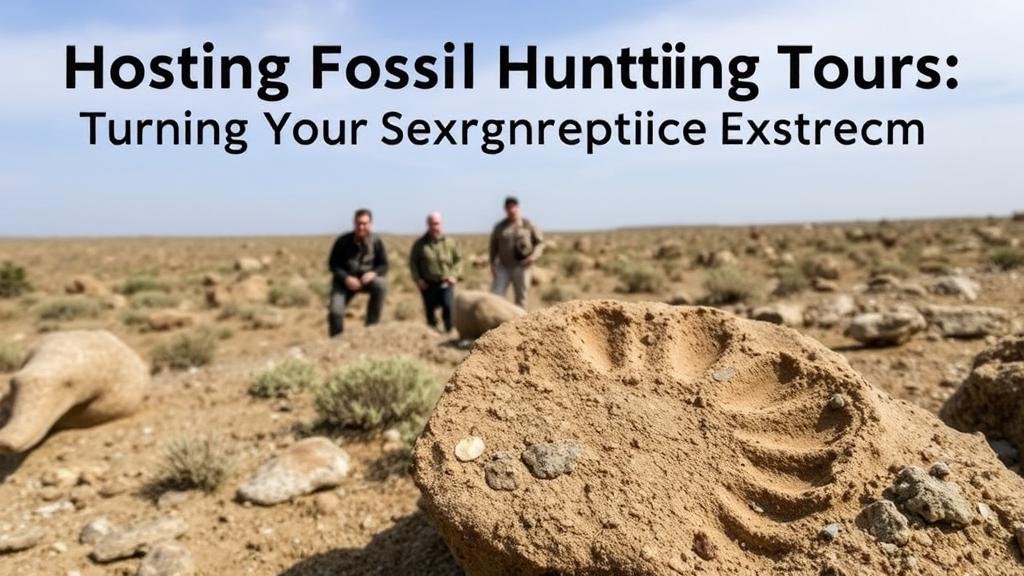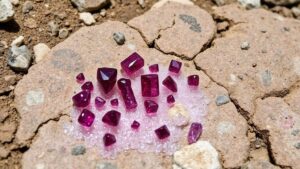Hosting Fossil Hunting Tours: Turning Your Expertise into a Revenue Stream
Hosting Fossil Hunting Tours: Turning Your Expertise into a Revenue Stream for Rockhounds and Mineral Collectors
Fossil hunting is an engaging and educational activity that attracts enthusiasts, known as rockhounds, from all over the globe. As a knowledgeable collector or palaeontologist, you have a unique opportunity to monetize your expertise by hosting fossil hunting tours. This article will guide you through the essential steps of establishing your tours, ensuring a rewarding experience not only for participants but also for your bottom line.
Understanding the Market
Before launching your fossil hunting tours, its crucial to understand your target market. Rockhounds typically seek adventure, knowledge, and the thrill of discovery. According to a study from the American Geological Institute, over 10 million people in the United States identify as rockhounds, making this a substantial market.1 Interest in fossil hunting often surges during school holidays and the summer months, indicating potential high-demand periods for your tours.
Choosing the Right Location
The success of your fossil hunting tours heavily relies on selecting the right location. Look for sites known for fossil deposits, such as:
- Badlands National Park, South Dakota: Known for its rich dinosaur fossils, including Triceratops.
- Giants Causeway, Northern Ireland: Offers unique volcanic rocks and fossilized creatures.
- Lee Creek Mine, North Carolina: Famous for its diverse marine fossils from the Miocene epoch.
While planning, it’s essential to obtain the necessary permits to collect fossils, as many locations have legal restrictions. Understanding local laws and regulations will help protect both your business and the environment.
Preparing Your Tour
Preparation is key to a successful fossil hunting tour. Here are some steps to consider:
- Develop an Itinerary: Structure your tour to include fossil identification, hands-on digging, and educational segments about the geological history of the area.
- Gather Equipment: Provide essential tools such as chisels, hammers, brushes, and safety gear. Consider offering rental services for those who lack their own equipment.
- Educational Materials: Create informational brochures or a digital guide that participants can use during their hunt. Include photographs and descriptions of common fossils they might find.
Including a research component, where participants can analyze their finds, can also enhance the tours educational value.
Marketing Your Tours
Effective marketing strategies are crucial for attracting customers. Use the following methods to reach your target audience:
- Social Media: Leverage platforms like Instagram and Facebook to share photos and experiences from your tours, engaging with potential clients.
- Local Events: Participate in gem and mineral shows or educational fairs to showcase your tours and network with enthusiasts.
- Online Booking Platforms: Register on sites like Airbnb Experiences or Eventbrite to reach a larger audience.
Also, consider offering early bird discounts or group rates to incentivize bookings.
Providing a Quality Experience
To ensure repeat business and positive reviews, focus on delivering an exceptional experience. Here are practical tips:
- Safety First: Prioritize the safety of your participants by providing comprehensive safety instructions and keeping a first aid kit on hand.
- Engagement: Foster interaction among participants. Use group activities for fossil identification or friendly competitions for the most impressive find.
- Follow-Up: After the tour, send a thank-you note with educational resources or a discount code for future tours. This keeps you connected with participants and encourages repeat business.
Real-World Application and Case Studies
Around the United States, several entrepreneurs have successfully transformed their fossil-hunting passion into a robust business model. Take, for example, David’s Fossil Tours in Ohio, which reports a customer base of over 500 participants annually. By collaborating with local schools, he has created educational programs tailored for students, merging science with adventure.
Another successful venture is Rockhound Adventures, operating in various states, which has achieved a 75% return rate of clients by offering themed tours that align with different seasons–highlighting marine fossils in winter and dinosaur tracks in summer.
Conclusion: Actionable Takeaways
Hosting fossil hunting tours can be a lucrative venture for passionate rockhounds and mineral collectors. Key strategies include:
- Identify your market and its needs.
- Select a location with rich fossil deposits.
- Prepare a robust itinerary and gather necessary tools.
- Employ effective marketing strategies to reach potential clients.
- Deliver a high-quality, engaging experience.
By following these best practices, you can turn your enthusiasm for fossils into a rewarding business, attracting fellow enthusiasts and sharing your passion along the way.
With the growing interest in palaeontology and fossil hunting, now is the perfect time to embark on this venture. Take the plunge and explore the possibilities that await you in the world of fossil hunting tours!
1. American Geological Institute, 2023. The Growth of the Rockhound Community. Retrieved from AGI archives.



